 | |
| Author | Laura Esquivel |
|---|---|
| Country | Mexico |
| Language | Spanish |
| Genre | Magical realism |
| Published | 2001 (Random House) |
| ISBN | 978-1-74051-082-0 |
Swift as Desire (in Spanish Tan veloz como el deseo) is a 2001 novel by the Mexican novelist Laura Esquivel. [1] [2]
 | |
| Author | Laura Esquivel |
|---|---|
| Country | Mexico |
| Language | Spanish |
| Genre | Magical realism |
| Published | 2001 (Random House) |
| ISBN | 978-1-74051-082-0 |
Swift as Desire (in Spanish Tan veloz como el deseo) is a 2001 novel by the Mexican novelist Laura Esquivel. [1] [2]
Don Júbilo, born with a smile on his face, was blessed at birth with almost supernatural hearing and an instinctive understanding of all kinds of communication, from an insect's faint rustle to the sweet sighs of a woman in love. He used his gift to become the peacemaker in his family, slyly mistranslating between his Spanish-speaking grandmother doña Jesusa, and his Mayan-speaking grandmother doña Itzel, who argue incessantly because the grandmother is angry her son married a non-Mayan, and doña Itzel is determined that Júbilo grow up connected to his heritage. Though the two women may say cruel things to each other, Júbilo gives each woman what she needs to hear, a skill he hones as a little boy that serves him well when he becomes a telegraph operator in adulthood.
At age fifteen Júbilo meets thirteen-year-old Lucha from a well-to-do family. Engaging in a slow, chaste relationship for seven years, the couple decide to get married. Passionate sexual creatures, Júbilo and Lucha communicate their love physically and frequently. Esquivel uses magical realism to tune Júbilo into frequencies that help him communicate verbally and with his body when he’s with his wife. Abandoning his dream to become a singer, Júbilo becomes a telegraph operator to support his young family. In the era before telephone services, interpreting Morse code messages for villagers and rich landowners alike puts Júbilo at the center of many lives as his own slowly falls apart. Lucha, the daughter of a wealthy family, is distressed by their relative poverty and her inability to conceive again after their first child, Raul, is born. Júbilo does the best he can, but his weakness for alcohol gets the better of him.
Lucha tries to adapt to Júbilo’s mentality that things can possess you and only love matters, an attitude that echoes the Mayan grandmother, who abhors technology because “The danger she saw was that technological advances served no purpose if they were not accompanied by an equivalent spiritual development.” Júbilo’s efforts to use Morse code at the telegraph office to deliver what the messenger should send is evidence that he takes her concerns to heart. However, she is unable to forgive him for the death of their second son, Ramiro
The narrative exists in two main timelines: First, the late 1930s and early 1940s when Júbilo was newly married, and the mid-1990s, when he is an old man on his death bed. Lucha has not spoken to him in decades, but the reason is not articulated. The later timeline is narrated by their daughter, Lluvia, and the rest by an omniscient narrator. As the story of the deeply-in-love couple slowly unfolds, the reader approaches the critical point that causes them to stop speaking. From a starting point of a truly magical ability in the area of communication, the culmination of the tale is a sort of mirror image, in which Júbilo as an old man is dying of Parkinson's, and cannot communicate at all.
Reviews were mixed, leaning towards the positive.
Kirkus Reviews calls the novel an imaginative, lyrical fictional memoir, which is both "tender and thoughtful, if at times rather stilted". [3] Similarly, Publishers Weekly also lauds Esquivel's style, calling Swift as Desire a "quirky and sensual story with a moralistic twist, its cute-as-can-be characters arguing and loving with equal passion." However, this review also acknowledges that the book "lacks that certain something that enthralled readers of Like Water for Chocolate ." The review concludes on a positive note, however, assuring readers that "chuckles and sighs" are to be had, and that "if a reader craves more of the sweet wackiness that made the author's first book so appealing, Swift As Desire certainly delivers." It declaims that "Esquivel's storytelling abilities are in top form here, and, despite its unoriginality, the novel succeeds in conveying a touching message of the power of familial and romantic love." [4]
Booklist 's Kathleen Hughes assures "fans of Esquivel, and there are many, will definitely enjoy this beautifully written story done in her trademark magical and bittersweet style." Library Journal's Mary Margaret Benson writes, "Once again, Mexican novelist Esquivel mixes together an unexpected blend of ingredients, in this case Mayan and Aztec numerology, communication technologies (from telegraphs to computers), and human passions..... full of passion, fascinating cultural history, and endearing characters and will be enjoyed by her many fans."
The Yale Review of Books panned the novel, estimating that the prose "ranges from the melodramatic ... to the mind-numbingly dull." [5] Kelly Koepke's BookPage review, however, was enthusiastic, calling Swift as Desire "an enchanting, bittersweet story that demonstrates in convincing fashion how keeping secrets leads to unhappiness, while true communication can lead to love." Koepke concludes that "Esquivel's illumination of the motives that drive us as humans, even when we do not understand them, sets her novels apart. That ability, coupled with her dramatic use of the lush, tropical settings of her native Mexico, creates another work of fiction that acknowledges the alchemy of connection and the despair that results from severing those ties." [6]

Angela Olive Pearce, who published under the name Angela Carter, was an English novelist, short story writer, poet, and journalist, known for her feminist, magical realism, and picaresque works. She is best known for her book The Bloody Chamber, which was published in 1979. In 2008, The Times ranked Carter tenth in their list of "The 50 greatest British writers since 1945". In 2012, Nights at the Circus was selected as the best ever winner of the James Tait Black Memorial Prize.
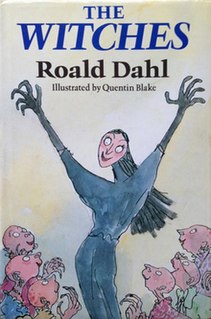
The Witches is a British children's dark fantasy novel by the British writer Roald Dahl. The story is set partly in Norway and partly in England, and features the experiences of a young English boy and his Norwegian grandmother in a world where child-hating societies of witches secretly exist in every country. The witches are ruled by the extremely vicious and powerful Grand High Witch, who arrives in England to organize her plan to turn all of the children in England into mice.

Love in the Time of Cholera is a novel by Colombian Nobel prize winning author Gabriel García Márquez. The novel was first published in Spanish in 1985. Alfred A. Knopf published an English translation in 1988.
Mills & Boon is a romance imprint of British publisher Harlequin UK Ltd. It was founded in 1908 by Gerald Rusgrove Mills and Charles Boon as a general publisher. The company moved towards escapist fiction for women in the 1930s. In 1971, the publisher was bought by the Canadian company Harlequin Enterprises, its North American distributor based in Toronto, with whom it had a long informal partnership. The two companies offer a number of imprints that between them account for almost three-quarters of the romance paperbacks published in Britain. Its print books are presently out-numbered and out-sold by the company's e-books, which allowed the publisher to double its output.

Laura Esquivel is a Mexican novelist, screenwriter and a politician who serves in the Chamber of Deputies (2012-2018) for the Morena Party. Her first novel Como agua para chocolate became a bestseller in Mexico and the United States, and was later developed into an award-winning film.
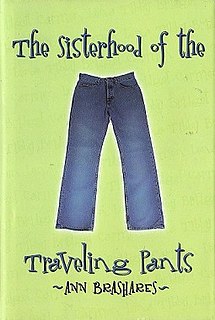
The Sisterhood of the Traveling Pants is a young adult novel by Ann Brashares published in 2001. It follows the adventures of four best friends — Lena Kaligaris, Tibby Rollins, Bridget Vreeland, and Carmen Lowell, who will be spending their first summer apart when a magical pair of jeans comes into their lives, turning their summer upside down. The book was adapted into a film of the same name in 2005. Four sequels to the book have been published, The Second Summer of the Sisterhood; Girls in Pants: The Third Summer of the Sisterhood; Forever in Blue: The Fourth Summer of the Sisterhood; and Sisterhood Everlasting.

Like Water for Chocolate is a novel by Mexican novelist and screenwriter Laura Esquivel.
Annie Sophie Cory was a British author of popular, racy, exotic New Woman novels under the pseudonyms Victoria Cross(e), Vivian Cory and V.C. Griffin.
Cassie Edwards is a best-selling American author of over 100 historical romance novels. She has been published by Dorchester Publishing, Signet Books, Kensington Publishing and Harlequin.

The Forgotten Beasts of Eld is a fantasy novel by American writer Patricia A. McKillip, and illustrators Peter Schaumann in 1974, and Alicia Austin in 1981, first published by Atheneum Publishers in 1974, and by Magic Carpet Books in 1996. It is the winner of the 1975 World Fantasy Award. The book centers on the fictional character Sybel, a woman previously cut off from the rest of the fictional world of Eldwold, as she learns to live and love in the world outside of the one she once knew.

Ángel Rebelde is a 2004 Miami, Florida-based telenovela produced by Fonovideo Productions which aired first on Venevisión in Venezuela. Mexican actors Grettel Valdez and Victor Noriega star as the main protagonists while Maritza Rodríguez and Ismael La Rosa star as the main antagonists. The telenovela aired on Univision from February 2 to December 6, 2004. It recently aired on Venevisión Plus in 2012.

Namita Gokhale is an Indian writer, editor, festival director, and publisher. Her debut novel, Paro: Dreams of Passion was released in 1984, and she has since written fiction and nonfiction, and edited nonfiction collections. She conceptualized and hosted the Doordarshan show Kitaabnama: Books and Beyond and is a founder and co-director of the Jaipur Literature Festival.
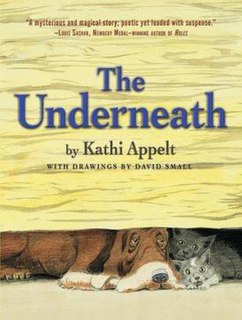
The Underneath is a children's book by Kathi Appelt. It tells the story of an abandoned cat who goes to live with a maltreated hound dog underneath a crooked old house in a bayou on the border between Louisiana and Texas. Published in 2008, The Underneath is a John Newbery Honor book, ALA Notable Children's Book and a National Book Award Finalist.

Gabriel García Márquez was a Colombian novelist, short-story writer, screenwriter, and journalist, known affectionately as Gabo[ˈɡaβo] or Gabito[ɡaˈβito] throughout Latin America. Considered one of the most significant authors of the 20th century, particularly in the Spanish language, he was awarded the 1972 Neustadt International Prize for Literature and the 1982 Nobel Prize in Literature. He pursued a self-directed education that resulted in leaving law school for a career in journalism. From early on he showed no inhibitions in his criticism of Colombian and foreign politics. In 1958 he married Mercedes Barcha; they had two sons, Rodrigo and Gonzalo.
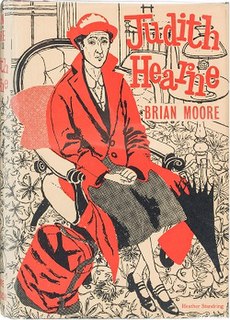
Judith Hearne, was regarded by Northern Irish-Canadian writer Brian Moore as his first novel. The book was published in 1955 after Moore had left Ireland and was living in Canada. It was rejected by 10 American publishers, then was accepted by a British publisher. Diana Athill's memoir Stet (2000) has information about the publishing of Judith Hearne.

The Doctor's Wife is a novel by Northern Irish-Canadian writer Brian Moore, published in 1976. Shortlisted for the Booker Prize, it tells the story of Sheila Redden, a doctor's wife from Belfast, who takes an American lover eleven years her junior while in Paris. She then separates from both her husband and her new lover.

The Zigzag Way is a 2004 novel by Anita Desai. The novel is about an American academic and writer who goes with his girlfriend to Mexico and rediscovers his passion for fiction writing.
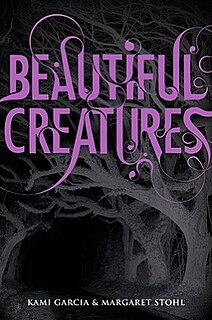
"Beautiful Creatures" is an American young adult novel written by authors Kami Garcia and Margaret Stohl and the first book in the Caster Chronicles series. The book was published on December 1, 2009, by Little, Brown, and Company. In the UK, "Beautiful Creatures" is published by Penguin Books. On January 3, 2013, a new edition of the novel was published, featuring images from the movie on the cover. The book was written in 12 weeks, inspired by a dare and was never intended to be published.

The Stars and the Blackness Between Them is an American young adult fiction book by Junauda Petrus. It was released on September 17, 2019 by Dutton Books, and tells the story of two teenage girls who build a relationship, as one acclimates to life in Minneapolis after moving from Trinidad, and the other battles an illness. The Stars and the Blackness Between Them received a Coretta Scott King Honor Award.
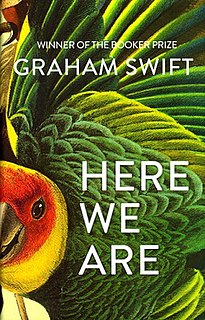
Here We Are is a novel published in 2020 by English author Graham Swift concerning a magician on Brighton Palace Pier.